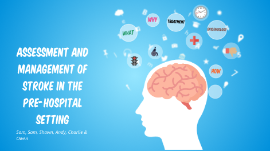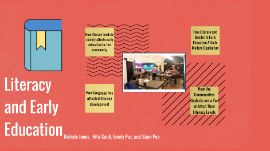final literacy template
Transcript: Nichole Jones , Rita Saidi, Emely Paz, and Sean Pen Literacy and Early Education How literacy levels in society affects early education in the community Many of the problems children face with literacy are impacted by their communnities. "Unfortunately, the quality of early childhood education a child receives is often determined by his or her economic status. Studies have shown that by age 5, half of children living in poverty are not academically or socially ready for school."-valeria garcia illiteracy in these areas start as early as a toddler. Implementing reading and writing can prevent illiteracy in these specific areas. “The Problem with Illiteracy and How It Affects All of Us.” Reading Partners, 25 July 2017, https://readingpartners.org/blog/problem-illiteracy-affects-us/. “Figure 2f from: Irimia R, Gottschling M (2016) Taxonomic Revision of Rochefortia Sw. (Ehretiaceae, Boraginales). Biodiversity Data Journal 4: e7720. Https://Doi.org/10.3897/BDJ.4.e7720.” doi:10.3897/bdj.4.e7720.figure2f. Perry, Nancy E., et al. “Teachers Developing Assessments of Early Literacy: A Community of Practice Project.” Teacher Education and Special Education: The Journal of the Teacher Education Division of the Council for Exceptional Children, vol. 22, no. 4, 1999, pp. 218–233., doi:10.1177/088840649902200404. Yurtoğlu, Nadir. “Http://www.Historystudies.net/dergi//birinci-Dunya-Savasinda-Bir-Asayis-Sorunu-Sebinkarahisar-Ermeni-isyani20181092a4a8f.Pdf.” History Studies International Journal of History, vol. 10, no. 7, 2018, pp. 241–264., doi:10.9737/hist.2018.658. Health problems low literacy levels are often correlated with poor health outcomes, including higher rates of hospitalization and more frequent outpatient visits, than when compared to adults with higher levels of literacy. -Garcia CEC Vista* "Reading ability and an individual’s health status are so closely correlated, that in recent years, the medical community has begun to treat reading as a public health issue."-valeria garcia Dropping Out According to the World Literacy Foundation, 1 in 5 children, adolescents, and youth is out of school. This shows that a majority of students are affected by their communities to a point where they are unable to attend school. This can be due to many factors including social classes, influence by parents' past education, and other social influences. Social Problems Children can learn literacy through social interaction between themselves and children and/or adults in or outside school. The american academy of pediatrics implements a toolkit to provide to parents to help aid their children in the importance of early childhood literacy. Unemployment the world literacy foundation states In order to receive a job offer in today’s society, it is a normal protocol to fill out a job application form. A candidate who is unable to fill out a form will be at a disadvantage How the Communities Students are a Part of Affect Their Literacy Levels The Connection Between Community and Literacy Various studies have found a correlation between the communities students live in and how well they do in school, specifically focusing on literacy. In these cases, two specific traits of these communities were often tied to lower literacy levels: poverty and the lack of family involvement in education. Poverty Poverty In one study, titled "The Relationship Between Income, Poverty, and Child Well-Being" by Ajay Chaudry, a correlation between poverty and inhibited educational success was justified. Chaudry found that families that were impoverished or less financially stable than peer families often had their children do worse in school. Chaudry, Ajay, and Christopher Wimer. “Poverty Is Not Just an Indicator: The Relationship Between Income, Poverty, and Child Well-Being.” Academic Pediatrics, Elsevier, 1 Apr. 2016, https://www.sciencedirect.com/science/article/pii/S1876285915003836. Researcher Kelley Taylor found that 20% of children in the United States lived in poverty. Combining this data alongside data from the federal government suggested that a staggering 51 percent of pre-K through 12th grade students reside in low-income households. This data alongside other sources link poverty and lower literacy levels. Taylor, Kelley “Kelley Taylor.” INSIGHT Into Diversity, 25 July 2019, https://www.insightintodiversity.com/povertys-long-lasting-effects-on-students-education and-success/. Donald Hernandez, a researcher at the Annie E. Casey Foundation, found a link between poverty and third-grade reading levels. His research concluded that if students are impoverished, they're often not at the standard third grade reading level by third grade. This leads to, as Hernandez states, "...students...often falter[ing] in their later grades and dropping out before earning a high school diploma." Hernandez, Donald J. “Double Jeopardy: How Third-Grade Reading Skills and Poverty Influence High School Graduation.” Annie E. Casey Foundation, Annie E. Casey Foundation.

















